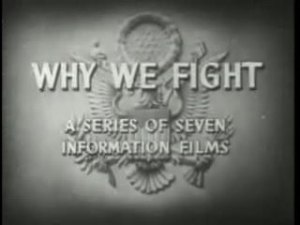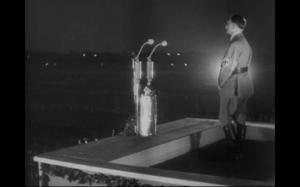In pre-World War Two film history, many countries used their nationalized film studios to produce propaganda. In Russia, the film industry produced many propaganda films in order to convince people to support the Communist Revolution, the most notable being Battleship Potemkin. In Germany, Hitler used the film industry to unite the German people, increase support for the Nazi Party, and to increase hostilities towards the Jewish-German population, the most notable being Triumph of the Will. France, England, and Italy all had nationalized studios, but did not use their films for widespread propaganda. Fascist Italy did not use film to spread propaganda, but they did practice heavy censorship of their film industry and other foreign films distributed to Italy. In Europe, governments had significant control over the film industries which allowed them to control the content that came out of the studios and what the public viewed.
Unlike most other countries, America’s film studios were never nationalized. From its beginnings, the film industry was an independent body that flourished and grew on its own.
When World War Two came to America’s footsteps by way of the horrific Pearl Harbor Attack, the government asked Hollywood for help. During World War Two (WW2 hereafter), countless propaganda films were produced by the major studios in order to get Americans to support the war effort morally and financially. Most of the propaganda films made during this period were inspired out of true American Patriotism shown by Hollywood and not by government intervention, though some film studios did make propaganda films after being asked by the government. Films were an integral part of selling WW2 to the American public due to the fact that America had previously been an isolationist nation, meaning that it did not interfere in world affairs.
Many filmmakers and studios willingly participated in creating WW2 propaganda films out of patriotism. Film studios such as Warner Bros and filmmakers such as Frank Capra were apart of the willing participants. Paramount agreed to participate in propaganda films after they bargained with the United States Federal Government to suspend an impending anti-trust lawsuit against them until after the war was completed. After gaining the support of the studios, the Office of War Information, a WW2 government agency set up to sell the war to the American public, worked with the film studios in order to set the framework for propaganda films.
The Office of War Information (OWI) laid out a set of guidelines for propaganda films to follow in order to convey a consistent set of messages:
- glorify the American lifestyle
- depict the enemy and their lifestyle (Japan, Germany, and Italian)
- reflect our allies well (French, English, and Russian)
- portray war industries at home
- illustrate what Americans can do at home to support the war
- show our military forces in action
The first set of WW2 films commissioned by the OWI were the Why We Fight series, directed by Frank Capra. Frank Capra’s Why We Fight series ignited passion into viewers to support the war effort by defining what America was fighting for, depicting Germany and Japan as the enemies that needed to be destroyed, and showing the Allied Powers in action. These films were the most overt propaganda films produced during this period. The most successful of the films was the first one, Prelude to War, which served as a vehicle to describe the difference between the American government and the governments of Germany, Italy, and Japan and to provide reasoning for American joining the war. The government originally commissioned this film to be made for government officials and soldiers, however, President Franklin Roosevelt decided it should go into public release in order to win over the American public as well. Prelude to War was so successful because it portrayed itself as an honest depiction of what the war was about and why America should enter it. Unlike other WW2 films, this film did not rely on an emotional connection, Prelude to War sold to the American public the idea of spreading American ideals throughout the world and protecting American idealism.
While Prelude to War was an overtly attempting to be propaganda, other films stubbly wove in OWI themes into story lines and used emotion to connect to the America viewers.
Casablanca, , a Warner Bros production, became an overwhelming success due to the seamless weaving of war propaganda and heartfelt romance. Casablanca served to glorify the French Rebels and visualize a war torn city full of people escaping the brutalities of war. American audiences reacted to the romance between the lead characters and how it was eventually torn apart by the war. More than anything, this film demonstrated the sacrifices that people needed to make for the war effort for the greater good of the world. While Americans were used to the sunny romances and lovers coming back together at the end of every love story, Casablanca took a different course by sacrificing the happy ending for a cause. Instead of reuniting, lovers tore themselves apart in order to contribute to the war effort; Rick sacrificed his lover Ilsa to continue to support a French rebel, a storyline that created to convince Americans to sacrifice for the greater good as well. Aside from the underlying message, Casablanca also served to glorify the French Resistance movement, depict the growing amount of displaced European refugees crowded into small towns because of the war, and finally, to show Americans as the upholders of Democracy and America as a safe haven for all people who wish to be free.
Many, many films were made in order to support the war effort. Very few films (if any) during this period were anti-war. Hollywood supported the war effort in other ways as well, Warner Bros opened up their studios to be used by the government for Army training. Many stars, such as James Stewart, Clark Gable, and Gene Autry, took a break from the silver screen and served in the army. Those who didn’t join the army participated in the United Service Organization (USO), which traveled around the world to support the troops.
After the war was over, the United States government went ahead with their anti-trust lawsuit against Paramount. Pro-war movies decreased, and the OWI got out of Hollywood. Hollywood’s large participation in the WW2 effort is very unique in Hollywood History. Almost the entire film industry participated in selling WW2 to the country without force or coercion. Hollywood became a united force that aligned itself with the views of the United States Government.
Since WW2, Hollywood has not participated in support of a war. Hollywood has not shown support of any of the preemptive, aggressive wars that the government has participated in, and the government has not asked cooperation of Hollywood since WW2. The Film Industry helped sell WW2 to the American people, but probably contributed to the American people’s contempt for later wars, such as Vietnam and the Gulf Wars.






